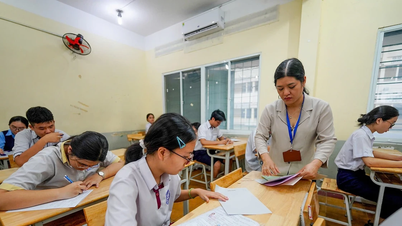The 2025 high school graduation exam in Math and English is attracting attention and debate among experts, teachers, students and parents. Some say the exam is too difficult and challenging; others support the new way of setting the exam. VietNamNet opens a forum to record diverse opinions, contributing to improving the exam and enhancing the quality of teaching and learning.
The following article is a professional analysis of the 2025 High School Graduation English exam by Dr. Cao Thi Hong Phuong, lecturer, researcher and teacher trainer.
As an English teacher, researcher and trainer, I wonder: Does the current English test reflect the educational philosophy we are aiming for, or is it making students, teachers and parents more tired?
When educational philosophy does not meet exam practice
The 2018 General Education Program focuses on comprehensive capacity development, in which English is considered an important tool for learning, communication and integration with the world . Although this year's English graduation exam has had innovations in topics and closer communication contexts, the structure still focuses on language recognition and does not really create opportunities for students to apply English. Are we teaching students to use English or just to do well on exams?
In Singapore, the O-Level English exam, the speaking part accounts for 20-30% of the total score. In the writing part, students must complete an email format, linked to a real-life situation. The New Zealand NCEA system (output-based assessment) divides English skills into sections, creative writing and reading comprehension of long texts.
Each competency has a different way of testing, most of which are conducted by the schools themselves and a small part by the government. I used to grade students' essays with the requirement of citing documents and making sharp arguments. From those experiences, I see more clearly that if we only test what is easy to grade and easy to measure, we are losing the opportunity to develop the true competencies of the learners.

The current English test has a dual purpose of both graduation and university admission. However, having only one common test puts unnecessary pressure on students who do not use English for admission.
I think of the tests in some advanced education systems that our country is also aiming for. For example, in New Zealand, students are allowed to choose output standards that match their learning and career goals, and the tests are divided into many levels. This helps students choose the path that suits their abilities. Vietnam can absolutely consider this model. A tiered test will help reduce pressure, improve fairness, and affirm humanistic values in student assessment.
When "studying for exams" overwhelms "studying for development"
I used to think that practicing test papers was the way to get into university. But the more I researched teaching and assessment, the more I realized that the learning process can be distorted by the pressure of exams. When learning becomes a tool to pass a test, it is no longer a journey of discovery , communication, and development of thinking in English.
In my role as a teacher trainer, I have met many teachers who are enthusiastic about active learning methods, but when they return to practice, they are forced to teach according to illustrated questions. Thus, teachers and students are probably caught up in the vortex of teaching and learning for exams, obscuring the true meaning of learning English: to use, to connect and to prepare for the future of study and work.
A progressive philosophy is “assessment for learning”, assessment to improve teaching and learning. Meanwhile, the current system is still too skewed towards “assessment of learning”, summative testing with a decisive exam, leaving students little opportunity to correct mistakes.
In New Zealand, internal exams allow students to resubmit if they do not meet the requirements, and teachers provide feedback so that students can produce better products. If we want to inspire real motivation to learn, assessments should reflect this spirit – not just to grade, but to empower and motivate.
Improvements can start right away
We can start with specific improvements to improve the whole system. First, design the exam in a clearly stratified direction: the basic part ensures graduation output standards, the advanced part serves university admission.
Second, incorporate more authentic language tasks, such as short writing or situational responses, albeit still in a multiple-choice format.
Third, strengthen teacher training on classroom assessment, so that the classroom does not revolve around practice questions only. In addition, it is necessary to publicly analyze parameters, before and after the exam, including testing, score distribution, difficulty, and classification of questions, to help transparency and continuous improvement.
I think that the high school graduation exam should be an important door opening fair opportunities for thousands of students and should not become a race for only the best, and should not cause confusion in public opinion.
Every test should be a mirror of the teaching, learning, and educational philosophy we are aiming for. If the test only tests what is easy to measure and grade, it will unintentionally stifle things that are difficult to measure, such as critical thinking, expression, creativity, or real-world communication skills.
Although we cannot expect an exam like those in developed countries, that does not mean we cannot start from the right steps. When we patiently improve, from teaching methods, learning methods to assessment methods, despite different starting points, Vietnamese students can still confidently step out into the world with their own true abilities.

Source: https://vietnamnet.vn/de-tieng-anh-thi-tot-nghiep-thpt-2025-do-nang-luc-hay-tao-ap-luc-2417192.html


![[Photo] Unique Phu Gia horse hat weaving craft](https://vphoto.vietnam.vn/thumb/1200x675/vietnam/resource/IMAGE/2025/10/10/1760084018320_ndo_br_01-jpg.webp)
![[Photo] Opening of the World Cultural Festival in Hanoi](https://vphoto.vietnam.vn/thumb/1200x675/vietnam/resource/IMAGE/2025/10/10/1760113426728_ndo_br_lehoi-khaimac-jpg.webp)
![[Photo] Ho Chi Minh City is brilliant with flags and flowers on the eve of the 1st Party Congress, term 2025-2030](https://vphoto.vietnam.vn/thumb/1200x675/vietnam/resource/IMAGE/2025/10/10/1760102923219_ndo_br_thiet-ke-chua-co-ten-43-png.webp)














![[Video] Ho Chi Minh City: Many subjects still lack teachers](https://vphoto.vietnam.vn/thumb/402x226/vietnam/resource/IMAGE/2025/10/10/1760108638254_gv-png.webp)



















































































Comment (0)